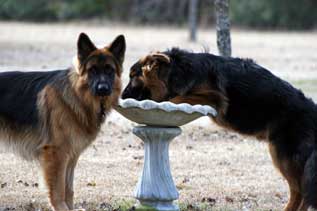Dehydrated Dogs
First of all, what are dehydrated dogs? At its most basic level, dehydration is the excessive loss of bodily fluids. Additionally, dehydration involves the loss of water as well as electrolytes and minerals such as chloride, sodium and potassium. Collectively these minerals are called electrolytes.
How does this happen?
There are several ways such as excessive panting, prolonged vomiting or diarrhea, excessive heat, inadequate fluid intake or even fever when sick, etc.
If your dog is panting, it is hot, simple enough. Now, if the dog does not drink enough to offset these fluid losses it will become dehydrated.
Treating Dehydrated Dogs
Keep in mind, dehydration in dogs is very serious and if left untreated it can eventually lead to serious health consequences such as organ failure or death.

Preventing Dehydrated Dogs
Thankfully prevention of dehydration is fairly easy and is by far the best thing to do overall. To prevent dehydration simply make sure that your dog always has plenty of fresh water available to him/her.
It is a good idea to leave two or three bowls filled with water around the house in various locations so he can get a drink relatively quickly, no matter where he is in your house (and outside too).
Other tips for preventing dehydration:
• give your dog ice to lick to rehydrate him/her slowly
• don't let your dog drink large amounts of water after heavy exercise (over drinking can quickly lead to vomiting and more fluids loss)
• after heavy exercise allow frequent but small amounts of fluids every few minutes
• give him an electrolyte supplement (Pedialyte is suitable for dogs) mixed into his water supply - electrolytes help do the job more quickly
• if he hasn't had a drink for a while, start re-hydrating the dog slowly IMPORTANT: If your dog refuses to drink for any extended period of time, consult your vet immediately!
Symptoms of Dehydrated Dogs One of the main symptoms of dehydration is a loss of skin elasticity. When the skin along the back is picked up into a fold, the skin stays up in a ridge. This is a classic symptom of dehydration in dogs. Another sign is dryness of the mouth and nose and eventually sunken eyes and circulatory collapse.You can also check the color of your dogs gums. Place your index finger firmly against the gums so that they appear white. Now, remove your finger and see how quickly the blood returns to the gums (so that they will become pink in that area again). This is called capillary refill time.
If the gums take a few seconds or so to return to their pink state your dog is probably dehydrated.
Treating a Dehydrated Dog
If your dog is dehydrated, you should seek veterinary attention immediately. Treatment will be directed at replacing fluids the dog has lost and preventing it from losing any other fluids - intravenous fluids may be needed depending on the severity of the dehydration.
If you can, get some water
into your dog in the meantime but don't overdo it. Too much at one time
can have just the opposite effect and cause vomiting - let the dog
drink small amounts over an extended period of time and get it to your
vet asap.
Return from Dehydrated Dogs to GSD Medical Emergencies
"Bulldogs are adorable, with faces like toads that have been sat on." - Colette
Sign up for promotions, news, discounts, and the chance to win prizes for you and your German Shepherd
